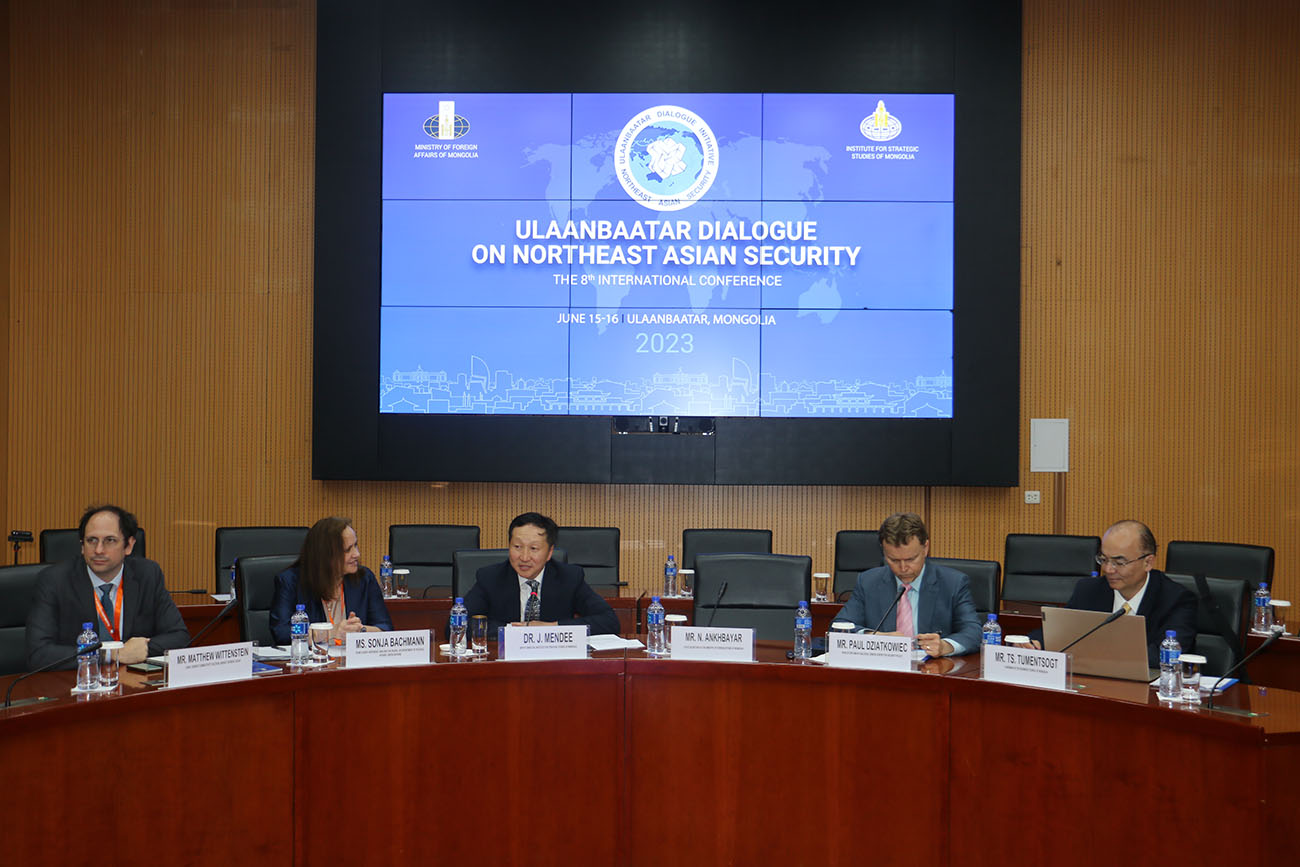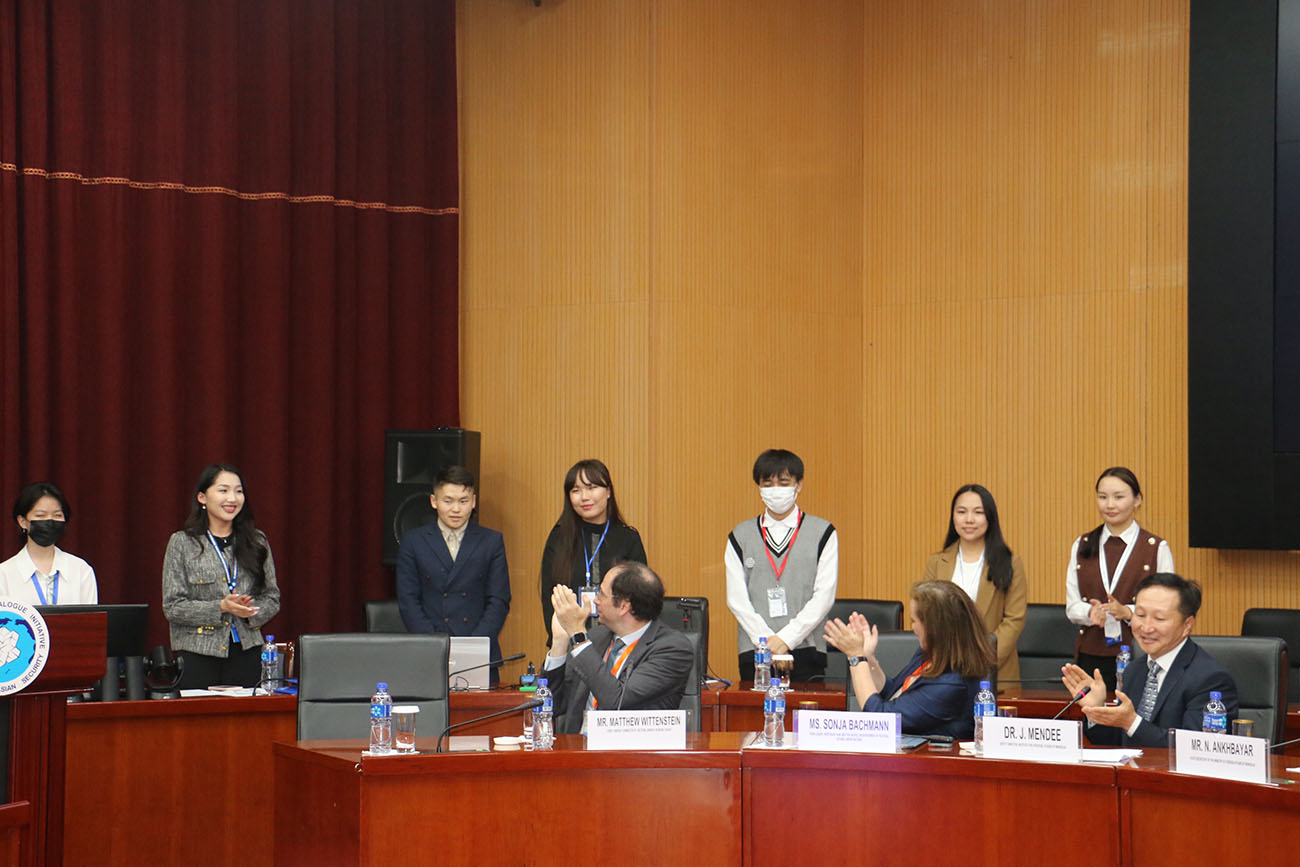The eighth “Ulaanbaatar Dialogue on Northeast Asian security” was held on June 15-16th, 2023. The conference was attended by over 200 participants consisting of scholars, researchers and government officials from Mongolia, Russia, China, ROK, Japan, United States, Australia, Italy, Canada, Germany, Sweden, Kyrgyzstan, United Kingdom, Turkey, Slovenia, Lithuania, the United Nations and other international organizations. Furthermore, representatives from international organizations and Diplomatic missions residing in Ulaanbaatar and international media representatives also attended the conference.The eighth “Ulaanbaatar Dialogue on Northeast Asian security” was held on June 15-16th, 2023. The conference was attended by over 200 participants consisting of scholars, researchers and government officials from Mongolia, Russia, China, ROK, Japan, United States, Australia, Italy, Canada, Germany, Sweden, Kyrgyzstan, United Kingdom, Turkey, Slovenia, Lithuania, the United Nations and other international organizations. Furthermore, representatives from international organizations and Diplomatic missions residing in Ulaanbaatar and international media representatives also attended the conference.
The conference consisted five sessions including:
Session One: Northeast Asian Security Challenges and Opportunities
Despite the ramifications of the COVID-19 pandemic, security tensions remain high in Northeast Asia due to the ongoing geopolitical and geo-economic rivalries among great powers and uncertainty in the Korean Peninsula. The session moderated by Dr. Mendee Jargalsaikhan, Deputy Director, Institute for Strategic Studies of Mongolia, and included speeches from Dr. Noboru Miyawaki, Professor, Faculty of Policy Science, Ritsumeikan University, Osaka, Japan, COL Munkh-Ochir Dorjjugder, Head of Department for Strategic Policy and Analysis, Executive Office of the National Security Council, Mongolia, Dr. Sun Ru, Research Professor, the Institute of World Political Studies, China Institutes of Contemporary International Relations (CICIR), PRC, Dr. Bomi Kim, Research Fellow, Institute for National Security Strategy, ROK, Dr. Vladimir Evseev, Head, Division for Eurasian Integration and SCO, Institute of CIS Countries, Russian Federation, Dr. Satu P. Limaye, Vice President, East-West Center, and Director of Research, East-West Center in Washington, USA
Session Two: Multilateral Cooperation in Northeast Asia
Although the Northeast Asian region lacks an overarching security mechanism, numerous efforts have been made to build confidence and trust. State actors as well as even non-state actors have put forward and tried to promote various types of confidence-building measures (CBMs). This session welcomed experts from the sub-region and beyond to share their perspectives on effective CBMs, examine past and current examples, and explore practical steps for developing and implementing sustainable CBMs in the region. The session leaded by Mr. Paul Dziatkowiec, Head of Diplomatic Dialogue, Geneva Centre for Security Policy, and speeches delivered by Dr. Antoine Maire, Research Associate, Foundation for Strategic Research (FRS), France, Mr. Aidar Kurmashev, Head, Department of Asian Studies, Center for International Studies, ISS, Kazakhstan, COL Altankhuu Badarch, Research Fellow, Institute for Strategic Studies, Mongolia, Dr hab. Michal Lubina, Jagiellonian University, Institute of Middle and Far East, Poland, Dr. Huseyin Bagci, Professor, Middle East Technical University, Türkiye.
Session Three: Futuring Peace in Northeast Asia
This session jointly organized by the Institute for Strategic Studies of Mongolia and the United Nations Department of Political and Peacebuilding Affairs (UN DPPA) and will provide a platform for youth representatives to share their views and recommendations on regional peace and security with policymakers. Youth representatives discussed the ways to strengthen ties between youth in the region, create common narratives, promote CBMs, and bridge gaps between generations. Chaired by Ms. Sonja Bachmann, Team Leader, Northeast Asia and the Pacific, UN Department of Political Affairs, United Nations, young leaders delivered presentations including Ms. Ijun Kim, Youth Peacebuilder, UNDPPA’s ‘Futuring Peace in Northeast Asia’; UNICEF Youth Foresight Fellow, ROK, Ms. Yuefeng Shi, Youth Peacebuilder, UNDPPA’s ‘Futuring Peace in Northeast Asia’, PRC, Ms. Khishigjargal Enkhbayar, Youth Peacebuilder, UNDPPA’s ‘Futuring Peace in Northeast Asia’; Secretary General of the NGO ‘United Nations Association of Mongolia’, Mongolia, Mr. Tengis Batbayar, Youth Peacebuilder, UNDPPA’s ‘Futuring Peace in Northeast Asia’, Mongolia.
Session Four: The Post-COVID Economic Cooperation in Northeast Asia
The COVID-19 pandemic has a strong footprint on trade, investment, and financial markets while impacting all communities and individuals. International financial institutions and countries have implemented substantial policy measures, and stimulus programs to reduce the impacts of the pandemic. This session provided a platform for economists, policymakers, and business representatives from Northeast Asian countries and international financial institutions to engage in constructive discussions about post-COVID-19 economic collaboration. Leaded by Mr.Tumentsogt Tsevegmid, Chairman of the Business Council of Mongolia, representatives of the businesses and academics sent a voice including Dr. Mimura Mitsuhiro, Professor, Economic and Social Research Institute for Northeast Asia, University of Niigata Prefecture (ERINA-UNP), Japan, Dr. Gregory Gleson, Professor, George C. Marshall European Center for Security Studies, USA, Mr. Yesukhei Enkhtuvshin, Director, Investment Research Center, Ministry of Foreign Affairs of Mongolia, Mr. Hannes A.Takacs, Head of Mongolia, European Bank for Reconstruction and Development Mr. Rufat Alimardanov, Resident Representative for Mongolia, IFC, Ms. Lakshmi Bojoo, Director, Economic Policy and Competitiveness Research Center, Mongolia
Session Five: Promoting Energy Cooperation in Northeast Asia
The session jointly organized by the Institute for Strategic Studies of Mongolia and the United Nations Economic and Social Commission for Asia and the Pacific (UNESCAP) welcoming regional experts and academics on energy cooperation. Participants shared their views on energy policies, sustainable development, best practices, and future trends in the Northeast Asian countries as well as challenges the region might face in the coming years. The session also encouraged participants to focus on how to promote regional energy integration through bilateral and multilateral cooperation. Two keynote speeches delivered by Mr. Ganbold Baasanjav, Head, Subregional Office for East and North-East Asia, ESCAP and Mr. Jason Vesey, Stockholm Environment Institute before the session. Following session headed by Mr. Matthew Wittenstein, Chief, Energy Connectivity Section, ESCAP, panel speakers included Mr. Xun Wang, National Energy Administration, PRC, Mr. Enkhtuvshin Ganbaatar, Head of Investment and Production Division, Ministry of Energy, Mongolia, Ms. Anna Pribylova, Counsellor, Department of International Cooperation, Ministry of Energy, Russian Federation, Dr. Dongil Lee, Secretary-General, CIGRE Korea, Mr. Baldorj Chimeddorj, Solar Engineer, World Bank PMO, Mr. Seiichiro Kimura, Renewable Energy Institute, Dr. Xinzhi Xu, Senior Engineer, GEIDCO, Mr. Yanqin Song, Senior Energy Specialist, World Bank, Mongolia.
The Youth regional forum has been organized as a side event of the Ulaanbaatar dialogue. The forum dedicated to the youth of the Asia Pacific region and will provide opportunity to be heard, to contribute, and to collaborate on peace, security, sustainability, and other challenging issues for them.
The forum welcomed 25 participants, including 10 Mongolian participants (under the age of 35). Although the regional focus is on Asia-Pacific, we welcomed youth representatives from other regions, but interested in the matters of Asia-Pacific. On June 17, participants joined four main sessions, concluding roundtable discussion, in which organizers and participants shared their views on the forum and ways ahead.

























